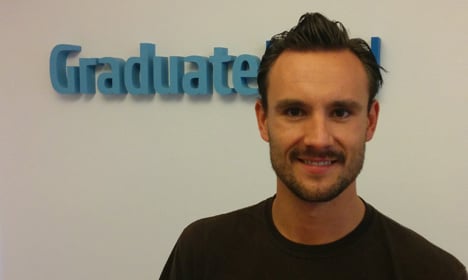JOBS
Don’t wait for the perfect time, do it now
In a new feature, The Local will look into one successful entrepreneur's life - the story behind their successes, major challenges and how being an entrepreneur changed their life forever. Kicking things off this week, Sparsh Sharma talks to Graduateland founder Patrick Lund.
Published: 1 October 2014 15:33 CEST

"If you’re waiting for the perfect time, then whoever you will be competing against in the future probably started today."
Graduateland is Europe's largest career network for students and graduates, providing young academics with a much-needed overview of relevant career opportunities both locally and abroad. Graduateland operates the official career portals of a wide range of European universities and via these channels helps companies recruit talent. Graduateland was established in 2011, and now has 30 employees across three offices.
The Local sat down with Patrick Lund, the 29-year-old Værløse native who is the COO & co-founder of Graduateland.
What led you to come up with this idea?
Graduateland was started in order to solve a problem that we were facing ourselves: How do we get an overview of relevant career opportunities as students? As a business student from an international study program in Copenhagen, local jobs didn't seem very interesting to me when compared to opportunities in bigger cities like London, Paris and Berlin. The university job board, however, only offered opportunities within Denmark. With students and graduates becoming increasingly mobile, we figured there must be a need for a powerful international career portal with a niche of only targeting young academics.
What were the initial challenges? How did you overcome them?
One of the main challenges was entering this with no knowledge of how a business is run. I had never started a business before, so there was a lot of initial fumbling in the dark. How to structure my time, which tasks to prioritise, and how to measure the potential of our idea in the first year, which was spent developing our technical platform.
Looking back, it seems insane how long it took before we were ready to launch. We hadn’t heard of the phrase "If you’re proud of what you’re launching, then you’re launching way too late". We wanted a great product that was ‘finished’ before we were ready to invite users inside.
Then, there were the classical, and typically Danish, concerns of telling my family that I was dropping out of university and betting on a seemingly risky venture. Coming from a family of doctors and engineers, it seemed unwise to not finish my education, since this proven path had generated stable and well-paid careers. Four years after launch, it is still something I have to defend every once in a while.
How has been the journey so far?
When you are building a startup, there will always be ups and downs. Pretty much every aspect of our business has had its highs and lows. Looking at the general growth though, it has been growing pretty steadily, which is awesome. As soon as we got our first university portal up and running, the sales have continued to increase, which obviously is a pretty simple yet relevant metric.
We are also extremely fortunate to have a killer team with rockstars. But this has been the result of a long process with too many hires and subsequent firings. Laying off people with whom you have become good friends is an awful experience.
Importantly, your own perception of your company changes as it matures. After the launch, everything moves so rapidly and the business evolves quickly. Then you tend to get into a rhythm: the operating mode. Having agreed on how the business should be run, you tend to risk losing sight of where you are headed in the long-time because you are so focused on the daily tasks. We are fortunate enough to have experienced mentors who have shake us up at intervals, so that we could get a bird's eye view of things and try to steer the business on a strategic level.
Where do you see Graduateland five years down the road?
We have always had extremely high ambitions for our company. In the first five years, we have become market leaders in Scandinavia, and naturally, we are enthusiastic about expanding to the key markets across Europe. Since our core product, the career portal, is relevant to universities across all European countries, we see it as an execution and marketing challenge to get it out there.
I definitely feel the product is good enough, so I hope we have muscles to compete in Germany, France and the UK.
On the user side, namely the students and graduates, our ambition is to become the go-to-place, when it comes to get their careers rolling. We want it to be the site our users check every morning – before they check their Facebook accounts.
How has becoming an entrepreneur changed you personally?
Honestly, I don’t think I have changed that much after having chosen the entrepreneurial path. It’s more that you start appreciating new aspects in people because you find yourself manoeuvring on a daily basis with high levels of uncertainty, while your primary driving force is the passion for your project. Then you really admire others who are similarly passionate about what they are doing, regardless of whether it’s building a mobile app, working as a tax consultant, or brewing the best cappuccino in town.
Entrepreneurship combines hobby and business. One can spot others who also love what they do from a mile away. That’s just fantastic.
Any personal reflections for budding entrepreneurs out there?
Anybody considering starting up a business, this should be the first test: If you don’t start drawing stock figures, arrows, and dollar signs immediately after reading this interview and instead postpone it to tomorrow, then the chance of getting off the ground is already down by 50 percent.
The world is full of ‘wantrepreneurs’, who have a lot of ideas to share around the barbecue but never find the perfect timing, partner, idea or something else to catalyse the project. If you’re waiting for the perfect time, then whoever you will be competing against in the future probably started today.
Url copied to clipboard!


 Please whitelist us to continue reading.
Please whitelist us to continue reading.
Member comments